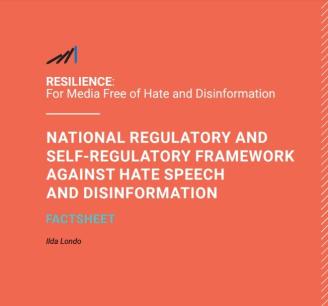National regulatory and self-regulatory framework against hate speech and disinformation

The factsheet provides an overview of existing legislation, sanctions, guidelines, and mechanisms in Albania that can be used to hold the media accountable for ethical violations related to hate speech and disinformation, but also to improve the overall quality of public discourse in the country in terms of ethics and inclusivity. The report also enlists a series of good practices, if available, and case studies that illustrate the current trends on regulation and self-regulation in the country related to these issues.
Hate speech in Albania is regulated through several provisions in the Criminal Code, which means that it applies to all citizens, and it is not media-specific. However, several articles refer to the use of computer systems as aggravating circumstances to the acts foreseen in the Criminal Code, and the media could be part of these acts in theory.
The standards of regulation of hate speech seem to be in line with international standards. Although they might be viewed as offering minimal protection against this phenomenon in some respect, on the other hand there are no red flags in terms of over-regulating, which could be dangerous to freedom of expression and might disrupt the balance. At the same time, the current suspension of discussion of the so-called defamation package after the media protests and the unfavourable legal opinion is also a good sign for the current regulation framework for the moment.
There is no specific regulation for disinformation in Albania, nor direct use of this term or a legal definition of what constitutes disinformation. However, the Criminal Code regulates the dissemination of false information with the aim of causing panic in Article 267, which states: Spreading false information or news, in words, in writing, or in any other manner, in order to incite a state of insecurity or panic in people, is punishable by a fine or up to five years of imprisonment. ”Furthermore, Article 271 covers cases when disinformation is given to emergency units intentionally to hinder their efficacy, committed by any means of information or communication, and is a contravention punishable by a fine or up to one year of imprisonment.